Canary Islands are begging Brits to spend their holidays – and money – there, despite protests against tourism
The Canary Islands’ tourism minister has urged British travelers to spend their holidays on the archipelago, despite growing protests against overtourism.
Jessica de León stressed that despite reports of booking cancellations and fears of holiday disruptions, ‘it is still safe to visit the Canary Islands, and we are happy to welcome you’.
British holidaymakers have reportedly called hotels in Tenerife to ask if they will be safe amid a series of mass protests planned across the islands by activists unsettled by the large influx of foreign holidaymakers.
Ms de León told The Telegraph that while she understood the protesters’ cause for concern, it was “unfair to blame tourism for the problems facing the Canary Islands.”
Activists are now preparing for a mass demonstration on Saturday to challenge the government over the archipelago’s deepening housing crisis.
Flyers like this one criticizing holidaymakers are being plastered on buildings all over Tenerife
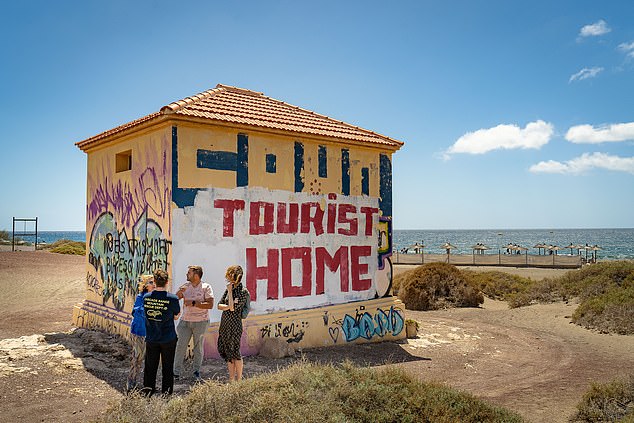
Graffiti has popped up all over the archipelago telling tourists not to visit
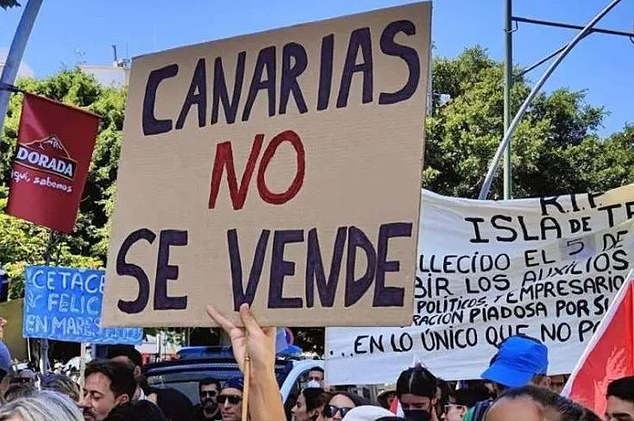
Nearly twenty associations have called for a protest in Gran Canaria against the island’s overcrowding on April 20, the same day as that in Tenerife. It is organized under the same motto ‘The Canary Islands have a limit’ (the sign says: Canarias not for sale)
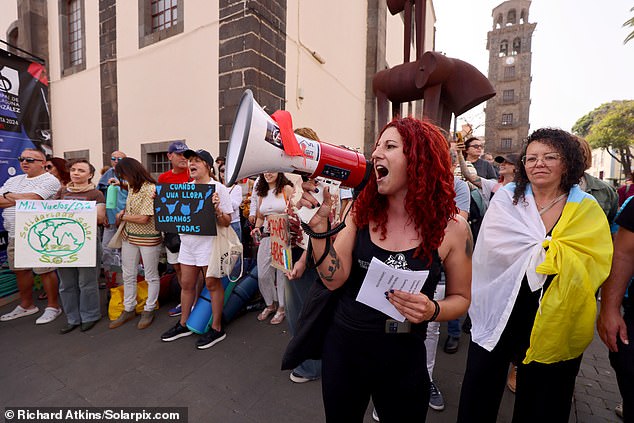
Protesters attend a hunger strike demonstration and march in La Laguna
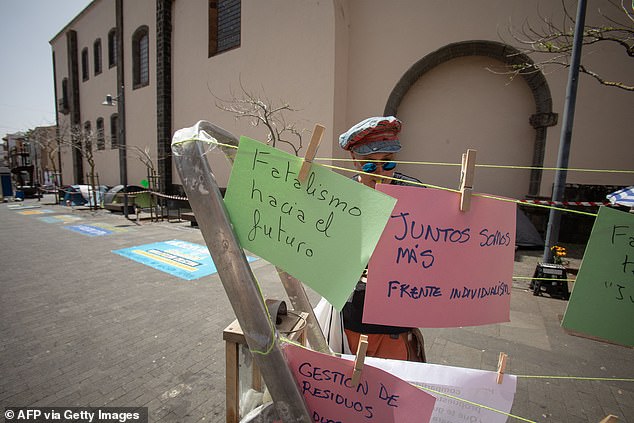
A man hangs signs written by demonstrators next to tents of activists on hunger strike to protest mass tourism infrastructure in La Laguna, on April 13, 2024
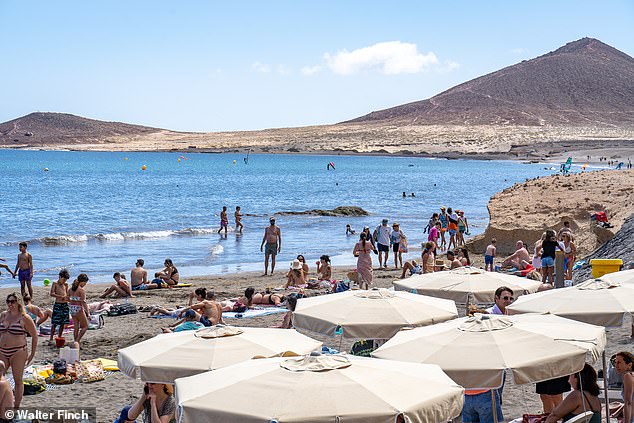
Tensions have recently erupted between British holidaymakers and the residents of the Canary Islands who have had enough
As officials rally to prevent disruptions ahead of the key tourist season, activists are planning protests in Tenerife, Gran Canaria, Fuerteventura, Lanzarote and La Palma to resist what they see as overtourism.
It is a great demonstration planned in Arrecife, Lanzarote for tomorrow, April 20, with flyers claiming that the islands ‘have a limit’ and that demonstrators will march for ‘conservation of natural areas, a tourism moratorium and stricter regulations for foreigners buying property’.
The biggest problem among locals is the rising cost of renting and buying homes, as landlords continue to buy up Airbnbs and tourist rentals, reducing supply and increasing prices.
Last week, activists also went on hunger strike as part of a protest against the effects of mass tourism on island life.
Nearly a dozen campaigners for a more sustainable kind of tourism went ahead with their threat outside a church in the historic town of La Laguna.
The hunger strikers want authorities to halt two tourism projects, including the construction of a five-star hotel on one of Tenerife’s last unspoilt beaches, La Tejita.
On La Palma, residents organized an event called ‘Punktagorda Foresta Rock’.
They told MailOnline that they plan to talk about the issues, not protest.
“It’s really just taking care of our home, the island and the people, setting healthy boundaries while making the needs crystal clear,” Louis Slabbert wrote on Twitter/X.
Ms de León expressed sympathy for the concerns, telling The Telegraph: ‘The problem is that an average of 3,000 houses have been built on the islands in the last five years, while the demand is for 20,000.
‘Last year only 200 social homes were built.’
Protesters blamed the archipelago’s administration in their manifesto, writing: “If we have reached this point, it is because we have no other choice and because of the serious mistakes committed by our evil government of the Canary Islands.”
“They endanger our present and future and that of new generations,” she added.
‘Don’t underestimate us, because there are a lot of us. We are all from the Canary Islands, a whole movement.
‘Without our work, our votes, you are nothing and nobody and you are not for what you are doing with the Canary Islands.
“We say enough is enough, not in our name,” warns the manifesto, read by “Canarias se exhausta” members Víctor Martín and Isora Mesa.
Tech worker Ivan Cerdeña Molina, 36, is helping organize the protest this month as part of his role with local conservation group ATAN (Asociación Tinerfeña de Amigos de la Naturaleza).
He previously told MailOnline: ‘It is a crisis, we urgently need to change things, people are living in their cars and even in caves, and locals cannot eat, drink or live well.
‘Airbnb and Booking.com are like a cancer that is consuming the island little by little.
“The benefits of the industry are not trickling down to ordinary people, whose salaries have not increased for years; the quality of life here is collapsing.”
Ivan was born and raised in El Medano, a once quiet town about a 20-minute drive east of the most popular tourist resort of Los Cristianos.
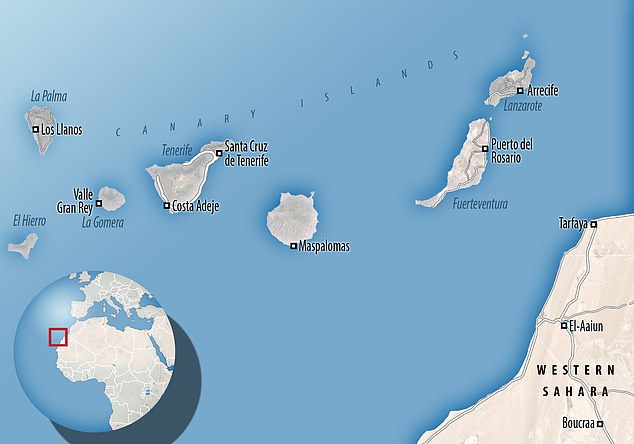
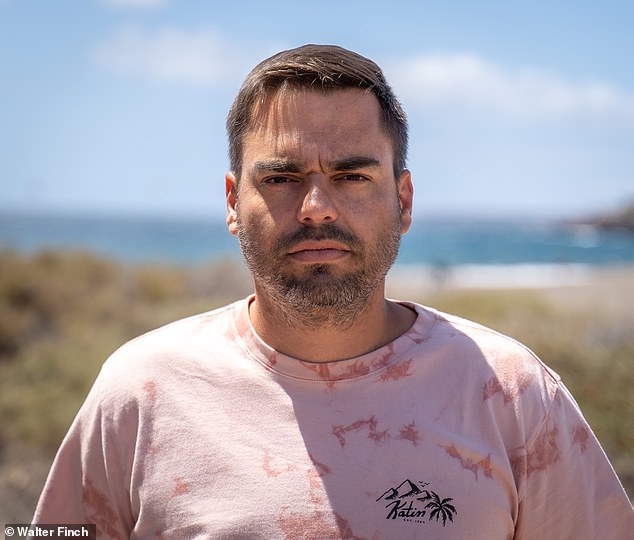
Tech worker Ivan Cerdeña Molina said: ‘People are living in their cars and even in caves, and locals cannot eat, drink or live well’ due to the crisis
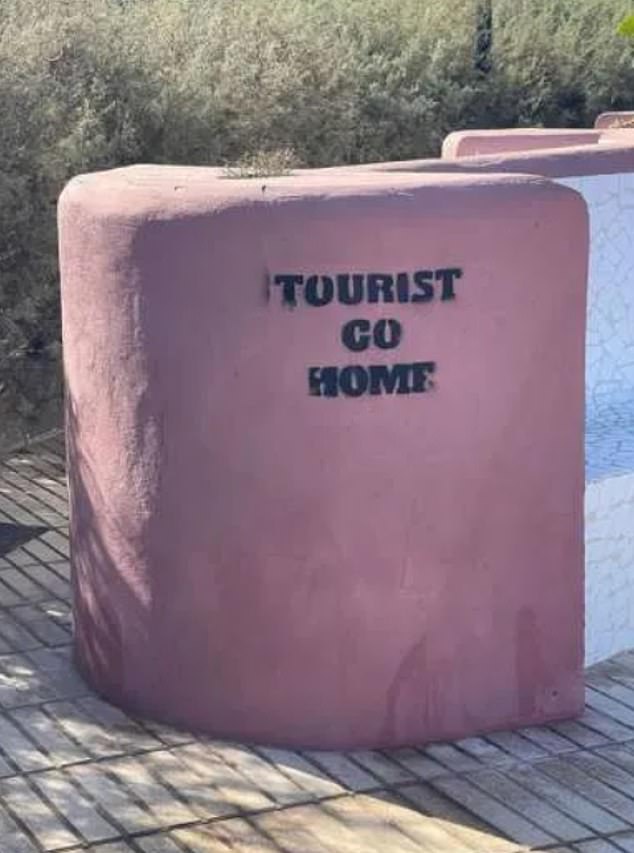
An anti-tourism message has been scrawled on the side of a bollard on the island
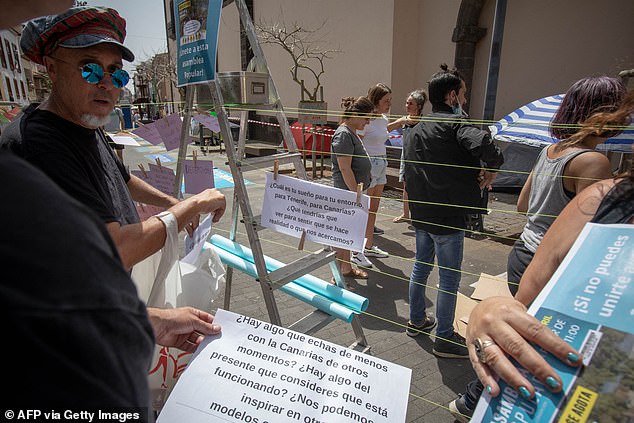
Members of the movement ‘Canaria se agota’ (‘Canaria is exhausted’) take part in a protest against the construction of a hotel near La Tejita playa and other mass tourism infrastructure, on April 13, 2024
The Canary Islands have built their economy largely around tourism and are hospitable 12.3 million visitors per year.
In 2023 alone, foreign travelers gave more than 20.3 billion euros in the region, accounting for a fifth of expenditure across Spain.
The direct and indirect contribution of tourism to the archipelago amounts to approximately 35 percent.
The volcanic islands were particularly hard hit by the Covid-19 pandemic and travel restrictions were imposed as a result.
The Canary Islands are the third most internationally visited region of Spain.
